Alyssa Leonard
Class of 2021
Elementary Education: Minor in Special Education with a concentration in Science
Lyndon Institute
Wheelock, Vermont
UMF’s College of Education, Health, and Rehabilitation Services (CEHR) was able to sit down with Alyssa to talk about her journey to UMF and her pathway to becoming an Elementary School Teacher.
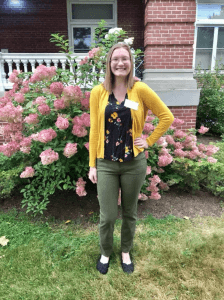
Alyssa Leonard standing outside of Mallet Hall before the first day of her practicum experience at Dirigo Elementary School in Peru, ME.
UMF CEHR: Being from out of state, how did you find out about UMF and why did you choose to come here?
Alyssa: My 4th-grade teacher, who I really looked up to, was an UMF alum. When talking about college choices my teacher said how she liked UMF and how it was such a great school for pre-service teachers. I considered it and after talking to my guidance counselor they had nothing but good things to say about UMF for teachers. After visiting, I realized that this university was amazing and it was everything I wanted. One of the things that stood out to me the most was how quickly the students in the teaching programs are able to get in the schools. Most teaching programs wait until the third year of college to get in the schools, where at UMF you are able to work with students in your second year, which is something I really liked.
UMF CEHR: Why did you want to become a teacher?
Alyssa: In elementary school, I had many supportive teachers who made me feel welcomed and safe. School was a place where I was able to be myself and I always felt happy! Hopefully, I can teach students who grow and like to come to school like I did. I want others to experience the positive side of school.
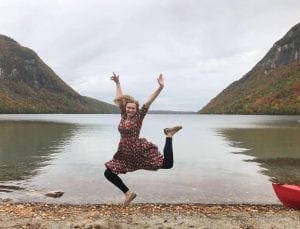 UMF CEHR: What is your best experience at UMF so far?
UMF CEHR: What is your best experience at UMF so far?
Alyssa: I have two experiences [at UMF] that I value: one in teaching and one outside of the teaching world. My best teaching experience is working for Wendy Kennedy in field services. Not only is she so sweet and kind but I am also able to experience the process and mechanics of teaching, as well as getting to see what is ahead that I have to look forward to. My best experience outside of teaching would be being involved with Bust a Move Beavers (BAM) and Dance Team. I am a kinesthetic learner and I love to express myself through motion. It has been such a blessing to find a home in the dance clubs here at UMF.
UMF CEHR: How do you think your minor in Special Education will shape your teaching experience?
Alyssa: My minor in Special Education will help me create a more inclusive classroom. I aspire to create lessons and units for all learning types. My minor will provide me with the tools I will need to succeed in becoming an inclusive educator.
UMF CEHR: What grade do you want to teach and why?
Alyssa: Right now, I want to teach 3rd grade, which is where my practicum placement is this semester. By the age of eight and nine, the kiddos have a lot of fundamentals under their belt and they are also eager to learn. You can do so much with them! I am not completely set on just teaching 3rd grade, I am willing to keep my options open. I might want to explore middle school a bit, so I can teach middle school science. I think the reason why middle school science is appealing to me is the fact that I didn’t have an intensive science curriculum. This would be a chance for me to feel like I’m giving back to an area that I lacked growing up. I would also be willing to teach middle school because they are goofy and at a fun age, but also my students are able to explore more in-depth science content.
UMF CEHR: You said middle school science is something you are passionate about, did you have a teacher who provided a great learning experience in science or is it just a passion?
Alyssa: In middle school, I did not have a positive learning experience with science, but it is a subject that I have always been passionate about. In middle school, we bounced around in science quite frequently. I had a more positive learning experience with science in high school where I learned more. My favorite areas of study in science are environmental science and biology, which are subjects that I would ideally hope to teach.
UMF CEHR: As a Community Assistant (CA) in the resident halls, how does this prepare you for a leadership role as an elementary school teacher?
Alyssa: Being a CA made me develop better leadership skills with colleagues. I get to make bulletin boards in the halls, which are a preview of what I will get to do in the classroom. One of the best things about being a CA is the bonds that I am able to make with my residents. Relationship building is very important to me, which I will be able to do as a classroom teacher, so this is a taste of what it will be like. Residents come to you a lot and as a CA I am able to provide them with advice, help, and other resources. It’s a really good feeling to be someone that your residents trust and can go to if they need someone who will listen and be there for them. Support from home is important for many students and I am glad to be someone who can listen and help them be as successful as possible.
UMF CEHR: As a student in our Elementary Education practicum, can you explain how this experience is helping you grow as a pre-service teacher?
Alyssa: I have made leaps and bounds in my journey to become a teacher. There are things that I could have never imagined that would have never become possible. This experience is so surreal and specific to what I want to do after college as a classroom teacher. Right now in my EDU 333 class, we are working on a 100 book challenge. We are choosing books in different genres: 2 social studies books, 2 science, 10 diversity, 2 math, 3 chapter read aloud k-3, 1 poetry, 1 alternative fairy tale, 1 concept book, 15 non fiction texts, and any others other until you reach 100. This project has allowed me to become more familiar with children’s literacy. In addition to that, we as a class have done work to recommend children’s books for our own library on campus to include in the collection. One of the books I really wanted to include was “How to Code a Sandcastle” by Josh Funk. I really like this book because it has a female represented in a STEM field. It also introduces children to coding! A topic which I think typically is under-represented in literature. In EDU 302, my technology class, we are also experimenting with using teacher blogs and other forms of technology. We are also asked to choose a tech tool (Quizlet, seesaw, snapchat, kahoot) and we must share and present about it. I choose an eSpark which is a tool I have seen my mentor teacher use in class. It’s a super cool tool that my school gets to use from a grant called moMEntum which is a K-3 literacy pilot.
When we met with Alyssa, she had just received her placement the day prior. At that point, she was not sure what to expect, but feeling excited and nervous. Alyssa is excited to explore what methods she may like in her placement and how that will apply to her classroom after UMF. She is eager to better herself as an educator from her mentor and learn from her every day. We followed up with Alyssa and she absolutely loves her practicum placement. She is working closely with her mentor teacher and has been able to implement a few lessons in the classroom including a lesson on long “o” words. In her free time, Alyssa Leonard is involved in an education club on campus called UMF Aspiring Educators of Maine.
CHER: If you could ask alumni a question, what would it be?
Alyssa said that she would ask one thing they regret they did not do here at UMF during their time as a student that would benefit me [Alyssa] as a pre-service educator at UMF.
Here’s Alyssa’s pre-service education blog, so we urge you to go follow her on this amazing journey she’s on!
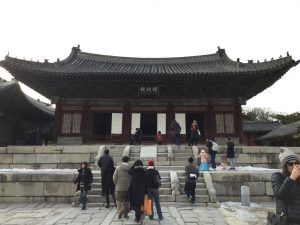 The University of Maine at Farmington currently has four teacher candidates conducting their student teaching at the Daegu International School in Daegu, South Korea. The Daegu International School (DIS) has a partnership with UMF that allows students to conduct their student teaching internationally while meeting all of the requirements to receive their degree. Tori Lands and Kayla Girardin were able to share their experience and discuss various challenges, opportunities, and stores from their experience.
The University of Maine at Farmington currently has four teacher candidates conducting their student teaching at the Daegu International School in Daegu, South Korea. The Daegu International School (DIS) has a partnership with UMF that allows students to conduct their student teaching internationally while meeting all of the requirements to receive their degree. Tori Lands and Kayla Girardin were able to share their experience and discuss various challenges, opportunities, and stores from their experience.
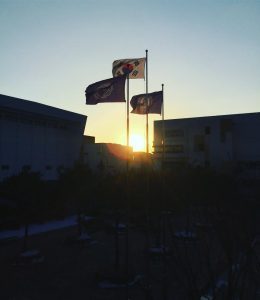 e most interesting. Maine is not as diverse as DIS, as Tori has students in her classroom from Korea, America, China, the Philippines, Japan, Australia- just to name a few. The diversity in her classroom has allowed her to learn from her students as well. “Instead of just reading about different cultures and countries these students can share personal stories and experiences,” Tori said. “It has been challenging to make sure I am sharing content in a way that makes sense to all the different learners in my classroom and making U.S. history relevant to students who may have only been to the states once or twice is interesting.” Both Tori and Kayla believe the cultural experience that students gain when teaching abroad has been much richer than teaching at home in the states.
e most interesting. Maine is not as diverse as DIS, as Tori has students in her classroom from Korea, America, China, the Philippines, Japan, Australia- just to name a few. The diversity in her classroom has allowed her to learn from her students as well. “Instead of just reading about different cultures and countries these students can share personal stories and experiences,” Tori said. “It has been challenging to make sure I am sharing content in a way that makes sense to all the different learners in my classroom and making U.S. history relevant to students who may have only been to the states once or twice is interesting.” Both Tori and Kayla believe the cultural experience that students gain when teaching abroad has been much richer than teaching at home in the states.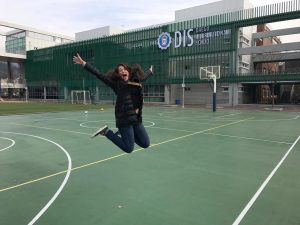
 and consecutive academic years in certain elementary and secondary schools and educational service agencies that serve low-income families, and meet other qualifications, you may be eligible for forgiveness of up to a combined total of $17,500 on your
and consecutive academic years in certain elementary and secondary schools and educational service agencies that serve low-income families, and meet other qualifications, you may be eligible for forgiveness of up to a combined total of $17,500 on your  UMF Scholarships: UMF offers over one hundred academic scholarships for students, and many of them are dedicated to students in the education field. Many scholarships have very few requirements to be eligible, and they are designed to help all students that are deserving. Below is list of just some of the scholarships offered to education majors at UMF. For a complete list of UMF scholarships and recipient requirements, visit the
UMF Scholarships: UMF offers over one hundred academic scholarships for students, and many of them are dedicated to students in the education field. Many scholarships have very few requirements to be eligible, and they are designed to help all students that are deserving. Below is list of just some of the scholarships offered to education majors at UMF. For a complete list of UMF scholarships and recipient requirements, visit the 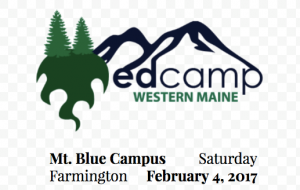
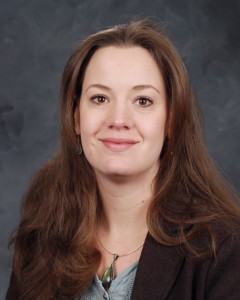 Dr. Leigh Ann Fish is coming to UMF from Troy, Ohio where she worked in public education as an elementary teacher and coordinator of gifted and talented education.
Dr. Leigh Ann Fish is coming to UMF from Troy, Ohio where she worked in public education as an elementary teacher and coordinator of gifted and talented education.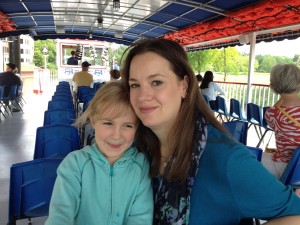 her husband and two young daughters hiking/kayaking, exploring historical sites, and trying her hand at modern-day “homesteading” on their 18th century farm.
her husband and two young daughters hiking/kayaking, exploring historical sites, and trying her hand at modern-day “homesteading” on their 18th century farm.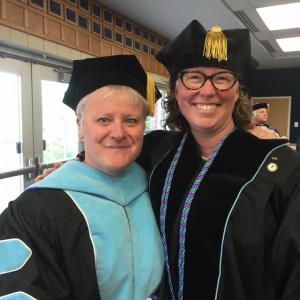
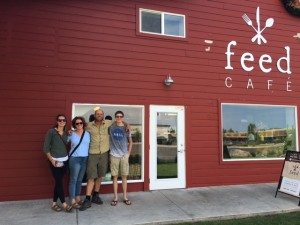
 ly-to-farm summer camps where entire families learned about the origins of their food and food preparation. I also have two children who are now 18 and 20 years old. When they were younger we spent hours (and hours) every day reading.
ly-to-farm summer camps where entire families learned about the origins of their food and food preparation. I also have two children who are now 18 and 20 years old. When they were younger we spent hours (and hours) every day reading.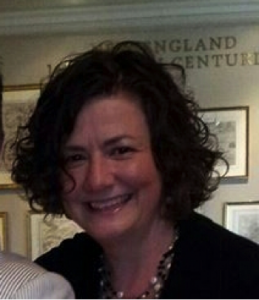 Julia Jeremias is the new Early Childhood Education Off-Campus Bachelor’s Degree Program Advisor and Coordinator. Julia comes to UMF from southern Maine where she is adjunct faculty in the early childhood department at Southern Maine Community College.
Julia Jeremias is the new Early Childhood Education Off-Campus Bachelor’s Degree Program Advisor and Coordinator. Julia comes to UMF from southern Maine where she is adjunct faculty in the early childhood department at Southern Maine Community College. After graduating from Mount Holyoke College and Lesley University, Julia started her life in education as a toddler teacher and continued in various rolls from teacher to public school administrator, until her family was transferred to Maine.
After graduating from Mount Holyoke College and Lesley University, Julia started her life in education as a toddler teacher and continued in various rolls from teacher to public school administrator, until her family was transferred to Maine.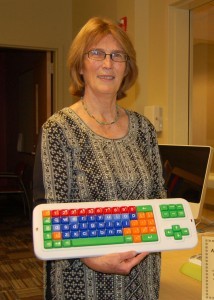 esentation of the first Loraine Spenciner scholarship. The event will be held Friday, May 6th, at noon in the Bjorn Lounge of the Theodora J. Kalikow Education Center.
esentation of the first Loraine Spenciner scholarship. The event will be held Friday, May 6th, at noon in the Bjorn Lounge of the Theodora J. Kalikow Education Center.